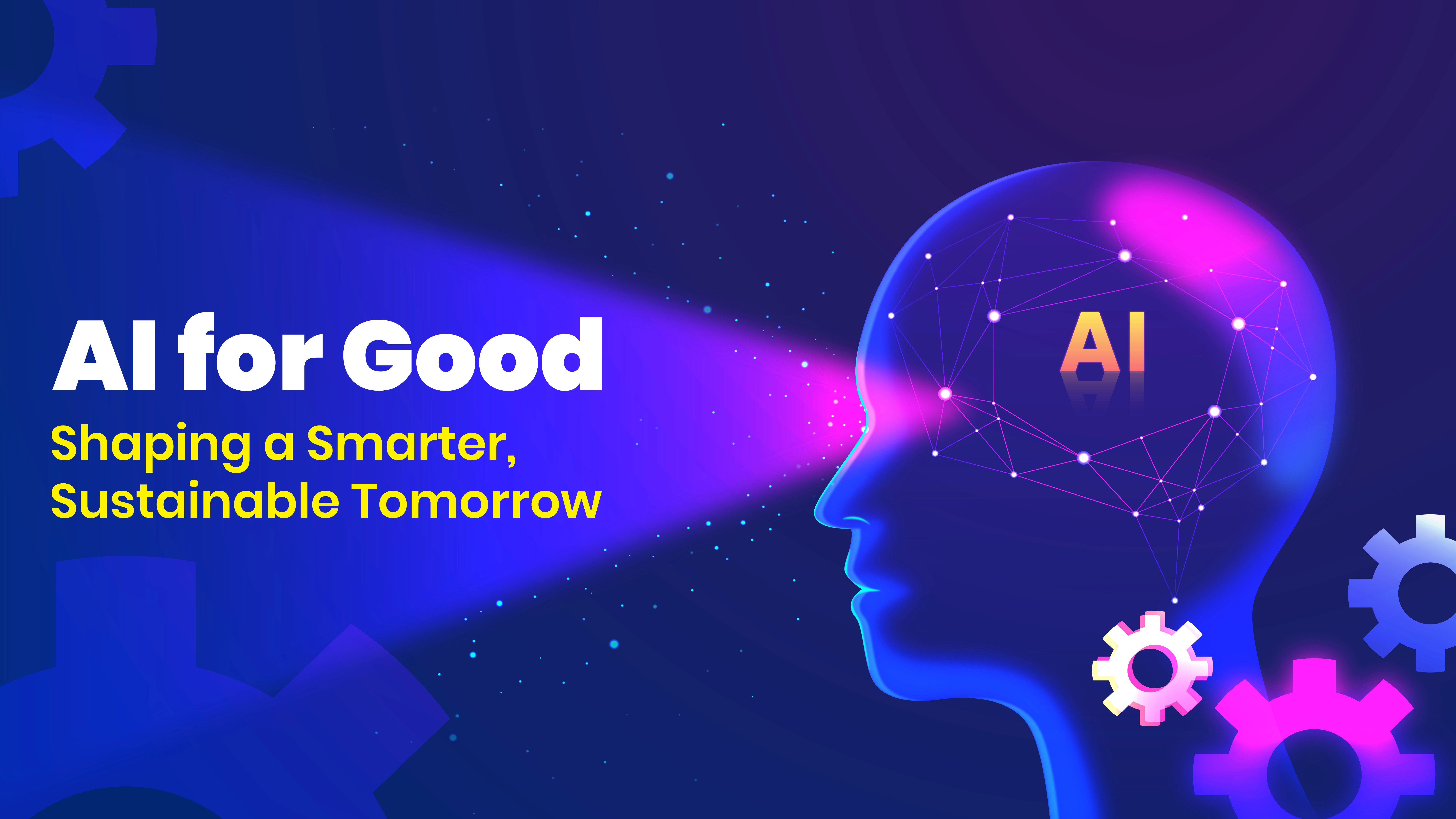AI for Good: Shaping a Smarter, Sustainable Tomorrow
Jan 22, 2025
AI for Good: Shaping a Smarter, Sustainable Tomorrow
Artificial Intelligence (AI) is no longer a futuristic concept confined to sci-fi movies. It is actively transforming industries and reshaping the way we solve some of the world's most pressing challenges. From tackling climate change to improving healthcare access, AI holds immense potential for driving positive change and paving the way for a smarter, more sustainable tomorrow.
The Role of AI in Sustainability
Sustainability has become a global priority as we face environmental degradation, resource depletion, and climate change. Here’s how AI is contributing to sustainable solutions:
Energy Efficiency: AI-powered systems can optimize energy usage by analyzing consumption patterns and predicting demand. Smart grids and AI-driven energy management systems ensure that power is distributed efficiently, minimizing waste and reducing carbon footprints. For example, machine learning algorithms can identify peak usage times and adjust power distribution accordingly, leading to substantial energy savings.
Climate Monitoring: AI algorithms process massive amounts of data from satellites, sensors, and other sources to monitor environmental changes. This helps scientists predict natural disasters, track deforestation, and measure air and water quality in real time. By enabling early detection of environmental risks, AI empowers governments and organizations to take proactive measures.
Sustainable Agriculture: By analyzing soil conditions, weather forecasts, and crop health, AI helps farmers make data-driven decisions. This leads to better yields, reduced water usage, and minimal reliance on harmful pesticides. Precision agriculture, powered by AI, ensures that resources are used efficiently, fostering long-term agricultural sustainability.
Wildlife Conservation: AI-powered tools are being used to monitor endangered species and their habitats. For instance, camera traps equipped with AI can identify and track animal movements, providing crucial data for conservation efforts. AI also helps in combating illegal poaching by analyzing patterns and predicting poaching hotspots.
AI in Social Good Initiatives
Beyond environmental sustainability, AI is being deployed to address social challenges and improve the quality of life for communities worldwide:
Healthcare Innovations: AI-powered diagnostic tools can analyze medical images and detect diseases like cancer at an early stage. Virtual health assistants and telemedicine platforms powered by AI are making healthcare more accessible, especially in underserved regions. For instance, AI-driven mobile apps can provide instant health advice and connect patients with doctors, bridging healthcare gaps.
Education for All: Personalized learning platforms use AI to tailor educational content to individual students' needs. This ensures that learners receive support that matches their pace and style, improving overall outcomes. Moreover, AI can help identify learning disabilities early, enabling timely intervention and support for students.
Disaster Response: AI aids in disaster management by analyzing data to predict disasters and coordinate relief efforts. Drones equipped with AI can survey affected areas, deliver supplies, and locate survivors. These technologies enhance the speed and efficiency of emergency response, saving countless lives.
Poverty Alleviation: AI is being used to identify areas of extreme poverty by analyzing satellite images and demographic data. This information helps governments and NGOs allocate resources effectively and develop targeted programs for economic development.
Urban Planning: AI is revolutionizing urban planning by analyzing traffic patterns, population growth, and infrastructure needs. This enables city planners to design smarter, more sustainable cities that prioritize efficient transportation, renewable energy integration, and green spaces.
Challenges and Ethical Considerations
While the potential of AI is vast, its deployment is not without challenges. Issues like data privacy, algorithmic bias, and the digital divide need to be addressed to ensure equitable benefits. Transparency in AI decision-making and robust ethical frameworks are essential to prevent misuse and maintain public trust. Additionally, the environmental cost of training and deploying AI models, which often require significant computational resources, must be considered to ensure AI itself aligns with sustainability goals.
A Collaborative Effort
Harnessing AI for good requires collaboration among governments, industries, academia, and civil society. Open-source initiatives and public-private partnerships can accelerate the development of AI-driven solutions while ensuring inclusivity and fairness. For example, collaborations between AI researchers and environmental organizations have led to innovative tools for wildlife conservation and habitat restoration. Similarly, partnerships between tech companies and healthcare providers have resulted in AI-powered platforms that improve patient outcomes.
Conclusion
AI is a powerful tool that, when used responsibly, can help us build a smarter, sustainable future. By integrating AI into our efforts to address global challenges, we can create innovative solutions that benefit both people and the planet. However, it is crucial to navigate this journey with a commitment to ethics, inclusivity, and sustainability. As we continue to innovate, let us ensure that AI serves as a force for good, fostering a world where technology and humanity thrive together.
With its ability to analyze vast amounts of data, predict trends, and offer scalable solutions, AI is poised to become an integral part of our collective efforts to build a better world. The key lies in ensuring that this transformative technology remains aligned with the values of equity, responsibility, and sustainability.

